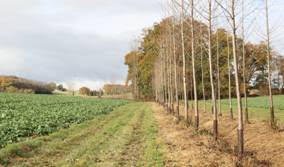The second meeting of the French AFINET RAIN was held on February, 2nd, 2018 in the Gers department (South West France).
It gathered 19 people from the local agroforestry sector, including farmers, agroforestry advisors, nursery technicians, river officers, agriculture and forestry extentionists, representatives from the administration/government offices and the wood industry.
The meeting was facilitated by Fabien Balaguer, AFINET innovation broker for France, and director of The French Agroforestry Association.
In the morning, an indoor session allowed participants to share views and ideas on the key incentives and constraints to agroforestry development. The focus was on developing diversified systems to allow improved profitability on both mid- and long-term basis for farmers.
The agenda included a number of issues identified while working/exchanging with stakeholders since the 1st meeting (Sept. 2017):
- Legal and administrative issues of integrating fast-growing species on agricultural land, in association with crops and/or livestock;
- Technical aspects of managing those species together with crops and ensuring quality of the final product;
- Financial support schemes to help farmers with the investment of planting/managing trees on agricultural lands.
In the afternoon, a field visit gave stakeholders the opportunity to see on-going trials at pilot farms and discuss more technical aspects ranging from growing/monitoring techniques in relation to final wood quality to possible organisational innovations to create local value chains improving marketability, especially for small-scale agroforestry.
Two participants from the wood industry (including poplar) attended the meeting and this allowed fruitful discussions on potential cooperation between upstream and downstream stakeholders.
According to Michel Delage, wood buyer at the Archimbaud sawmill, promoting poplar-based agroforestry systems could be a promising option to encourage farmers to produce poplar wood locally, while allowing income diversification for farms. Nevertheless, it is important to keep in mind that, in order to be successful, such initiative has to be developed together with a high-level advisory programme to ensure best marketable quality of the final products.












